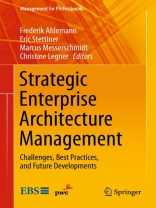The Enterprise Architecture Management (EAM) discipline deals with the alignment of business and information systems architectures. While EAM has long been regarded as a discipline for IT managers, this book takes a different stance: It explains how top executives can use EAM to leverage their strategic planning and controlling processes, as well as how it can contribute to their sustainable competitive advantage. Based on the analysis of best practices from eight leading European companies from various industries, the book presents the crucial elements of successful EAM. It outlines what executives need to do in terms of governance, processes, methodologies, and culture in order to bring their management to the next level. Beyond this, the book points out how EAM could develop in the next decade, thus allowing today’s managers to prepare for the future architecture management.
Table of Content
An EAM Navigator.- The EAM agenda for the Cx O.- EAM governance and organisation.- Embedding EAM in strategic planning.- Embedding EAM into the Project Lifecycle.- Embedding EAM in operation and monitoring.- EA Frameworks, Modelling and Tools.- People, Adoption and Introduction of EAM.- EAM 2020 – The future of the Discipline.












